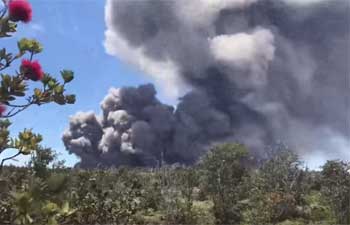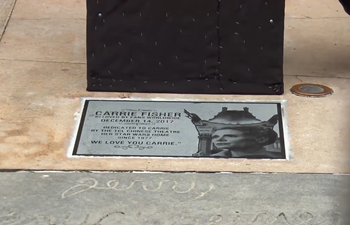LOS ANGELES, May 29 (Xinhua) -- Virgin Galactic's SpaceShipTwo suborbital spaceplane has conducted a second successful, supersonic, rocket powered test flight on Tuesday, bringing the company one step closer to realizing its long-delayed dreams of space tourism and research flights.
VSS Unity, the second SpaceShipTwo built for Virgin Galactic, took off attached to its WhiteKnightTwo carrier aircraft from the Mojave Air and Space Port in California.
About an hour later after the liftoff, SpaceShipTwo separated from WhiteKnightTwo. The spaceplane glided to a runway landing in Mojave about 10 minutes later.
The rocket motor burned for the planned 31 seconds and propelled Unity to a speed of Mach 1.9 and an altitude of about 34,900 meters on the flight, according to Virgin Galactic.
"Seeing Unity soar upwards at supersonic speeds is inspiring and absolutely breathtaking. We are getting ever closer to realizing our goals. Congratulations to the whole team!" Virgin Galactic founder Richard Branson said in a statement.
The team will now conduct flight data review for this flight and continue preparing for the next flight.
"As will be the case for future commercial flights, Unity's unique re-entry feathering system was deployed for the initial descent before the final glide home to a smooth runway landing," the company said, "Once in commercial service, Virgin Galactic's spaceships are designed to be turned around and flown at a higher frequency than has traditionally been the case for human spaceflight."
Tuesday's flight came less than two months after the first powered flight on April 5. Virgin Galactic said the flight brought the company "a little closer" to its goal.
The first SpaceShipTwo, VSS Enterprise, broke up during its fourth powered test in October 2014, killing the vehicle's co-pilot and injuring the pilot.
Virgin Galactic's mission is described "to be the Spaceline for Earth." Its reusable SpaceShipTwo spaceflight system consists of WhiteKnightTwo, a custom-built, carrier aircraft, and passenger carrying spaceship SpaceShipTwo.
WhiteKnightTwo is a custom-built, four-engine, dual-fuselage jet aircraft, designed to carry SpaceShipTwo up to an altitude of about 15,240 meters -- about the beginning of outer space, where tourists would be able to experience weightlessness.
According to the private company, the first WhiteKnightTwo, VMS Eve, was rolled-out in 2008 and has completed an extensive test flight program. VMS Eve is the largest all composite aviation vehicle in service and has a unique heavy payload, high altitude capability.
The current operational SpaceShipTwo was the first to be manufactured by The Spaceship Company and named VSS Unity by Professor Stephen Hawking during an unveiling ceremony in 2016.
SpaceShipTwo, powered by a hybrid rocket motor - combining elements of solid rockets and liquid rocket engines, is designed to carry two pilots and six passengers on trips.
Virgin Galactic started selling SpaceShipTwo tickets more than a decade ago. A ticket costs 250,000 U.S. dollars.













